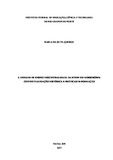A Unidade de Ensino Descentralizada da ETFRN em Mossoró/RN: contextualização histórica e práticas de formação

Visualizar/
Data
2017-03-31Autor
Queiroz, Karla da Silva
http://lattes.cnpq.br/3536785753258434
Metadado
Mostrar registro completoResumo
During the first term of President José Sarney (1985-1990) and the first expansion of the
Vocational Professional Education in Brazil, the first Decentralized Teaching Unit (Unidade de
Ensino Descentralizada – UNED) of the Federal Technical School of Rio Grande do Norte
(ETFRN) was created in the city of Mossoró. It was inaugurated on the 29th of December in
1994. It aimed at amplifying the possibilities of Professional Education offers in the region and
areas nearby, as well as promoting the “Citizen Technician” formation as it was established in
the Pedagogical Political Project (PPP) of ETFRN that started in 1995. This dissertation
analyzes the formative practices developed with the pedagogical team, the faculty and the
students at UNED/ETFRN in Mossoró in order to implement the propositions of the PPP. I
established the time interval between 1995 and 1998 – respectively the years of the beginning
and graduation of the first class of Electro-Mechanics. Aligned with the research line of
Teachers’ Formation and Pedagogical Practices at the Master’s Degree program in Vocational
Professional Education, this investigation presents a qualitative approach and it is inserted in
the field of School Institutions according to the studies of Magalhães (2004), Sanfelice (2007)
and Nosella and Buffa (2005, 2008). Data collection followed a documental research and
interviews through the Oral History method. For the documental research, I used the PPP,
ordinances, reports, action plans, ETFRN’s agendas, newspapers clippings from Mossoró press,
brochures from UNED/ETFRN, pamphlets designed by students and photographical records.
The interviews were recorded, transcribed and analyzed. The interviews had an open structure.
I interviewed members of the pedagogical team, managers, teachers and former students from
UNED/ETFRN. It totaled 26 subjects. The field research and the data analysis was based on
document studies by Le Goff (1990) and the memory study by Le Goff (1990), Halbwachs
(2003), Pollak (1992) and Benjamin (1994). The results led to the conclusions that
the UNED/ETFRN in Mossoró faced many challenges because it created high expectations in
the population of Mossoró and cities nearby about the possibilities of jobs in the world of work.
In addition, the institutional principles primed for a student formation not focused on the purely
technical conception of Vocational Professional Education but also on a formation aligned with
the perspective of citizenship. However, the great challenge faced was internal: to provide the
pedagogical team, the faculty and the students an integral human and polytechnic formation
that would break from the opposition between theory and practice, technical and propaedeutic
subjects. Therefore, the administration implemented a training for the pedagogical team so that
they would be ready to promote the continuous teachers’ formation through weekly pedagogical
meetings – teachers would be ready for their teaching practice based on the principles of the
PPP. Although not every interviewed teacher mentioned the existence of such a formation
process, the analysis of the sources showed that the teachers’ formation was a reality at the
UNED/ETFRN. In its own way, it made possible for the faculty and the institution staff to
promote, in the school daily life, the development of a culture towards the formation of
the “Citizen Technician”. The students were taught to build up their critical thought and acted
their own citizenship.
History of Scholar Institutions. ETFRN.
Political Pedagogical Project. Formative Practices.



